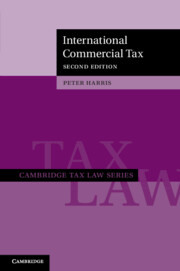Book contents
- International Commercial Tax
- Cambridge Tax Law
- International Commercial Tax
- Copyright page
- Contents
- Preface
- Abbreviations
- Introduction
- 1 Fundamentals and Sources of International Tax Law
- 2 The Jurisdiction to Tax
- 3 Source Country Taxation
- 4 Residence Country Taxation
- 5 The Limited Scope of Treaties
- 6 Changes of Source and Residence
- 7 Bilateral Administrative Issues
- Conclusion
- References
4 - Residence Country Taxation
Published online by Cambridge University Press: 29 February 2020
- International Commercial Tax
- Cambridge Tax Law
- International Commercial Tax
- Copyright page
- Contents
- Preface
- Abbreviations
- Introduction
- 1 Fundamentals and Sources of International Tax Law
- 2 The Jurisdiction to Tax
- 3 Source Country Taxation
- 4 Residence Country Taxation
- 5 The Limited Scope of Treaties
- 6 Changes of Source and Residence
- 7 Bilateral Administrative Issues
- Conclusion
- References
Summary
Considers tax treaty limitations on residence country taxing rights, including the obligation to provide foreign tax relief and methods of relief for double taxation, especially the exemption method and credit method. The treaty obligation is compared to the limited approach under EU Law. The separate legal identity of corporations causes two problems for foreign tax relief. First, economic double taxation of corporate income results if the tax charge cascades on distributions up a chain of corporations. Methods of underlying foreign tax relief or indirect foreign tax relief are considered. Second, controlled foreign corporations may be used as a dividend trap or method of avoiding tax. Rules to address these are discussed. The second heading considers methods of calculating foreign income and the impact on foreign tax relief. Here there are few rules in tax treaties but burgeoning EU case law. Allocating expenses between foreign and domestic activities is critical when calculating the volume of exempt foreign income or, under the foreign tax credit method, the limitation on credit. Expenses may produce losses. The treatment of foreign losses on domestic income and domestic losses on foreign income are considered. Finally, cross-border intragroup losses under various systems of group relief are considered.
Keywords
- Type
- Chapter
- Information
- International Commercial Tax , pp. 340 - 445Publisher: Cambridge University PressPrint publication year: 2020



